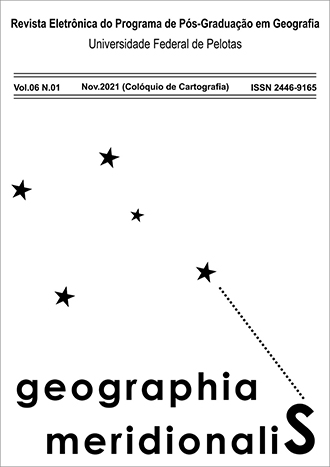COMO DESENVOLVER O RACIOCÍNIO GEOGRÁFICO: EXPERIÊNCIA CARTOGRÁFICA COM BOLA NO ENSINO FUNDAMENTAL ANOS FINAIS / HOW TO DEVELOP THE GEOGRAPHICAL REASONING: CARTOGRAPHIC EXPERIENCE WITH BALL IN ELEMENTARY SCHOOL
Resumo
Este trabalho objetiva analisar uma atividade cartográfica desenvolvida com turmas de estudantes de 7º anos do Ensino Fundamental de uma escola pública localizada em Brasília-DF. Realizada em grupo, a atividade constitui-se em transformar uma bola de plástico em um globo terrestre em duas etapas: primeiro, os estudantes deveriam traçar o sistema de coordenadas geográficas, que serviriam de referência para a segunda etapa, qual seja, o desenho dos continentes. A professora regente da turma, autora da pesquisa, produziu os dados ao longo de quatro semanas, totalizando 12 aulas. Os procedimentos metodológicos utilizados foram: orientações aos alunos, a cada aula, antes de começarem a atividade prática; anotações dos diálogos dos estudantes no diário da pesquisadora; registro, por meio de fotografias, das etapas executadas. Utilizou-se dos princípios da pesquisa qualitativa para a produção e análise dos dados. Se, por um lado, os resultados permitiram identificar dificuldades dos estudantes ao enunciarem fragilidades quanto à alfabetização cartográfica, por outro, evidenciaram a importância do letramento cartográfico ao produzir interesse e motivação durante as atividades, especialmente porque a dinâmica das aulas se deu a partir da interação, diálogo e pesquisa. Foi possível constatar diferentes níveis de raciocínios geográficos para cumprir as demandas de cada fase da atividade.
ABSTRACT
This work aims to analyze a cartographic activity developed with students of the 7th grade of an elementary public school located in Brasília-DF. The activity required that each group of students transformed a plastic ball into a terrestrial globe in two stages: firstly, the students should draw in the ball the geographic coordinate system, which would serve as a reference for the second stage, namely, the drawing of the continents. The leading teacher of the class, author of this research, produced the data over four weeks, in 12 classes. The methodological procedures used were guidance to the students, at each class, before the beginning of the practical activity; notes of students' dialogues in the researcher's diary; recording, through photographs, of the steps performed. The principles of qualitative research were used for the production and analysis of data. If, on the one hand, the results made it possible to identify students' difficulties in enunciating weaknesses regarding cartographic literacy, on the other hand, they showed the importance of cartographic literacy in producing interest and motivation during activities, especially because the dynamics of the classes were based in interaction, dialogue and research. It was possible to verify different levels of geographical reasoning to fulfill the demands of each phase of the activity.
Keywords: Cartographic Literacy; Didactic Strategies; Terrestrial Globe; Dialogism
Prezado autor: Utilize o modelo abaixo (link), preenchendo e enviando o arquivo digital em PDF como documento suplementar ao realizar a submissão de seu manuscrito.



